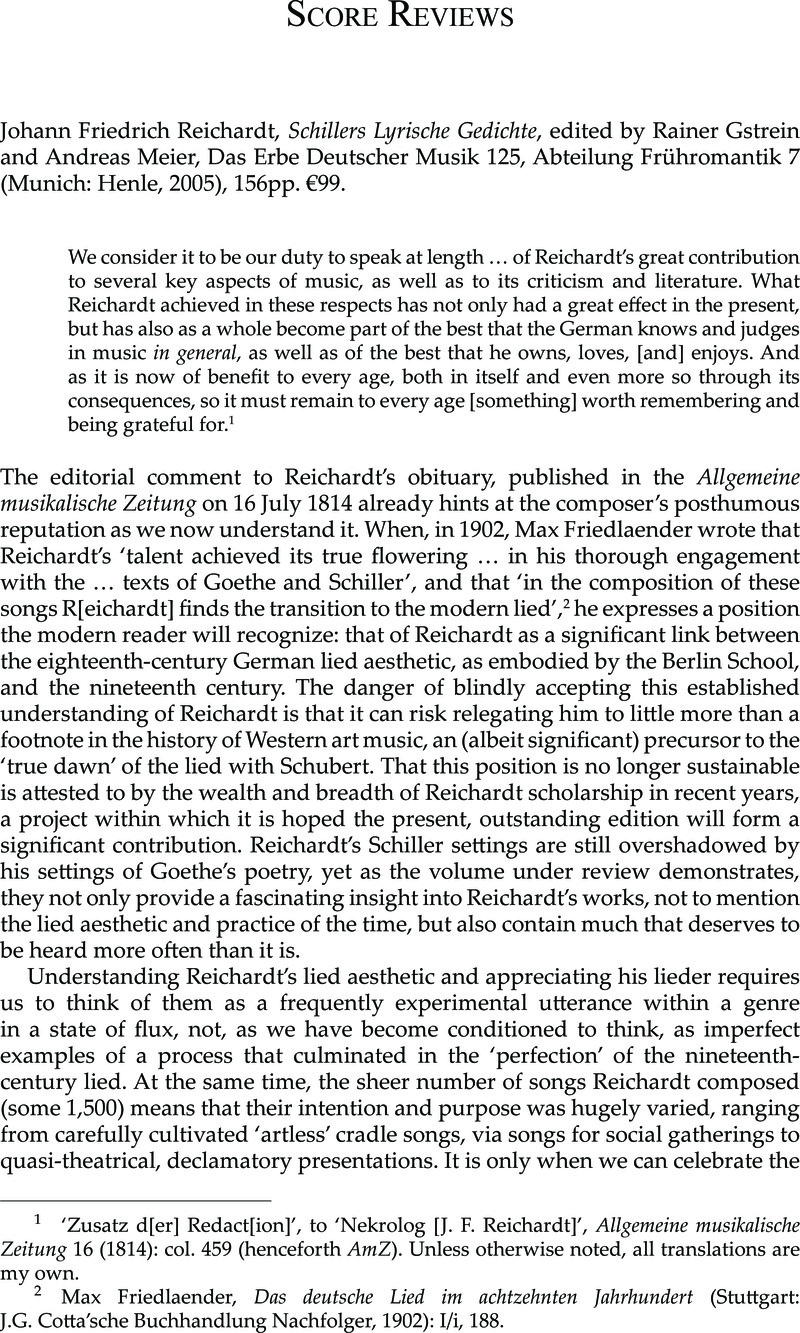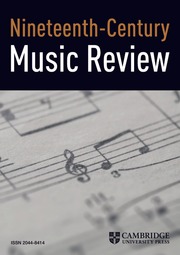No CrossRef data available.
Article contents
Johann Friedrich Reichardt, Schillers Lyrische Gedichte, edited by Rainer Gstrein and Andreas Meier, Das Erbe Deutscher Musik 125, Abteilung Frühromantik 7 (Munich: Henle, 2005), 156pp. €99.
Published online by Cambridge University Press: 13 April 2011
Abstract

- Type
- Score Reviews
- Information
- Copyright
- Copyright © Cambridge University Press 2009
References
1 ‘Zusatz d[er] Redact[ion]’, to ‘Nekrolog [J. F. Reichardt]’, Allgemeine musikalische Zeitung 16 (1814): col. 459Google Scholar (henceforth AmZ). Unless otherwise noted, all translations are my own.
2 Friedlaender, Max, Das deutsche Lied im achtzehnten Jahrhundert (Stuttgart: J.G. Cotta'sche Buchhandlung Nachfolger, 1902): I/i, 188.Google Scholar
3 In 1776, Reichardt noted that he was unable to listen to a piece of music without ‘making comments on it, and these in turn I am unable to keep to myself’; Reichardt, quoted in Canisius, Claus, Goethe und die Musik (Munich: Piper, 1999): 61Google Scholar.
4 Helm, Eugene and Hartung, Günter, ‘Reichardt, Johann Friedrich, §2: Music’, Grove Music Online (www.oxfordmusiconline.com, accessed 30 June 2008).Google Scholar I have deliberately taken their comments, which refer to Reichardt’s, Lieder für Kinder aus Campes Kinderbibliothek (Hamburg in 1781),Google Scholar out of context.
5 Both through his wide-ranging travels and his hospitality at his estate of Giebichenstein, Reichardt was in contact with many of the most influential early Romantics. Jean Paul, Novalis, Schleiermacher, Schlegel, von Arnim, J.H. Voss and the brothers Grimm all stayed at Giebichenstein, earning Reichardt's home the reputation of being a ‘hostel of Romanticism’ (quoted in Helm and Hartung, ‘Reichardt, Johann Friedrich, §1: Life’). Helm and Hartung evocatively describe Giebichenstein as ‘a centre of intellectual Republicanism, of lieder and romantic poetry, folksong and folk art’ (ibid.).
6 Reichardt, , ‘Guten Rath statt der Vorrede’, in Oden und Lieder (1779), quoted inGoogle ScholarFriedlaender, , Das deutsche Lied, 190Google Scholar.
7 Friedlaender notes that Neefe gave the same advice to the singer in his preface to his Oden von Klopstock, published in 1776 (No. 200) ( Friedlaender, , Das deutsche Lied, 190, n. **): ‘In any case the singer should conscientiously study every poem before he sings it. … Only then will one be able to present them correctly, only then will one know to place the forte and piano in the remaining verses accurately, for the strengthening and lessening of the sound of the voice and of the piano cannot remain in the same place in all verses’ (Neefe, quoted in Friedlaender, ibid., 229, n. *)Google Scholar.
8 Reichardt, ‘Guten Rath statt der Vorrede’, quoted in Friedlaender, , Das deutsche Lied, 190Google Scholar.
9 Gstrein, Rainer and Meier, Andreas, ‘Vorwort’, in Johann Friedrich Reichardt, Schillers Lyrische Gedichte, ed. Gstein, Rainer and Meier, Andreas, Musik, Das Erbe Deutscher 125, Abteilung Frühromantik 7 (Munich: G. Henle, 2005): vii.Google Scholar
10 The following account is indebted to Gstrein and Meier. On the arguments between Schiller and Reichardt see Gstrein and Meier, ‘Vorwort’, in particular vii–xi, and Engels, Hans-Werner, ‘Es began in Neumühlen … Goethes und Schiller Streitereien mit Johann Friedrich Reichardt’, in Bracker, Jürgen, ed., Frieden für das Welttheater. Goethe – ein Mitwirkender, Beobachter und Vermittler zwischen Welt und Theater, Politik und Geschichte. Max Wegner zum 80. Geburtstag (Hamburg: Hamburger Museumsverein, 1982): 99–105Google Scholar.
11 Claudine von Villa Bella became ‘the first German opera successfully presented to the Prussian court by its own Kapellmeister’. Helm and Hartung, ‘Reichardt, Johann Friedrich, §1: Life’.
12 Schiller was at that time living on the Frauenplan, ‘mere paces from Goethe's … residence’ (Gstrein and Meier, ‘Vorwort’, vii). See ibid., vii–viii.
13 Schiller quoted in ibid., viii.
14 Schiller quoted in ibid., viii.
15 Ibid.
16 Ibid., ix.
17 Schiller writing to Goethe on 27 January 1796, quoted in ibid., ix.
18 Ibid., x.
19 This despite his attack on Schiller's abilities as a poet in his magazine Deutschland; Reichardt, , ‘Erklärungen des Herausgebers an das Publikum, über die Xenien im Schillerschen Musenalmanach 1797’, repr. in Deutschland (1989): 267–9;Google Scholar see also Gstrein and Meier, ‘Vorwort’, x. From Schiller's perspective see Schiller urging Goethe to attack Reichardt as a musician above. Nevertheless, stagings of both Schiller's Wallensteins Lager (first performance 12 October 1798) and his adaptation of Shakespeare's Macbeth (14 May 1800) used music by Reichardt (see Gstrein and Meier, ‘Vorwort’, x).
20 On the letter Reichardt wrote to Charlotte von Schiller in January 1810, see Gstrein and Meier, ‘Vorwort’, viii.
21 Göthe's Lieder, Oden, Balladen und Romanzen (Leipzig: Breitkopf & Härtel, 1809–1811): i–iv.Google Scholar
22 ‘Schillers lyrische Gedichte’, AmZ 13 (1811): cols 24–30.Google Scholar
23 ‘Göthe's Lieder, Oden, Balladen und Romanzen’, AmZ 12 (1809–1810): cols. 3–15, 17–29.Google Scholar
24 Ibid., col. 29.
25 ‘Schillers lyrische Gedichte’, col. 24.
26 Ibid., col. 25.
27 Ibid.
28 Ibid., col. 24.
29 Ibid., col. 25.
30 Ibid. In contrast, the reviewer finds Vol. 2, which comprises Nos 32–50 of the present edition, in all respects superior, considering it to be ‘amongst the best that Mr. R[eichardt] has ever written’. ‘Schillers lyrische Gedichte vol.2’, AmZ 14 (1812), col. 15Google Scholar.
31 ‘Schillers lyrische Gedichte’, col. 24.
32 Ibid., col. 25. Again, this statement relates to Vol. 1 only.
33 See my discussion of Schubert's ‘Laura am Clavier’ in Franke, Lars, ‘Music as Daemonic Voice in Late Eighteenth- and Early Nineteenth-Century German Aesthetics’ (PhD diss., University of Southampton, 2005): 183–204Google Scholar.
34 See the index of settings of Schiller's poetry in Brandstaeter, Franz August, Über Schillers Lyrik im Verhältnis zu ihrer musikalischen Behandlung (Berlin: Dümmler, 1863).Google Scholar
35 The numbering of the songs is taken from Reichardt, Schillers Lyrische Gedichte.
36 Reichardt, ‘Guten Rath statt der Vorrede’, quoted in Friedlaender, , Das deutsche Lied, 190.Google Scholar
37 Thus the reviewer of the Allgemeine musikalische Zeitung fails to mention ‘Alpenjäger’ in his review of the second volume of Schillers Lyrische Gedichte, instead highlighting the conventional (and stropic) first song of the second volume, ‘Der Jüngling am Bache’, and the effective, if not unproblematic, ‘Fantasie an Laura’ amongst others as ‘outstanding as a whole or in some major respect’. ‘Der Alpenjäger’ was the second song of that volume. See ‘Schillers lyrische Gedichte [Vol. 2]’, col. 15.
38 Jack M. Stein considers Reichardt to be at his most original in his Deklamationsstücke, seeing them as ‘the result of a serious preoccupation with the problem of word-tone combination and the adjustment of musical speech to the patterns of the German language’ ( Stein, , Poem and Music in the German Lied from Gluck to Hugo Wolf (Cambridge, MA: Harvard University Press, 1971)).CrossRefGoogle Scholar The reviewer of the Allgemeine musikalische Zeitung goes further, seeing the form as deeply suited to Reichardt’s peculiarities as a musician: ‘Should any form suit the peculiarities of Mr. R[eichardt] completely, then it is this one; and if he has delivered works in any form that no one of our present masters has surpassed, then it is equally in this’ (‘Schillers lyrische Gedichte’, col. 28).
39 Reichardt, ‘Guten Rath statt der Vorrede’, quoted in Friedlaender, , Das deutsche Lied, 190.Google Scholar
40 Objections were merely to Reichardt's lack of self-censorship. For example, of the first version of Reichardt's setting of ‘An die Freude’ (No. 25) the reviewer writes that the inclusion of a second version would suggest that the composer himself felt the first version to be weak, ‘but he seems incapable of throwing away anything that he has written’ (‘Schillers lyrische Gedichte’, col. 27).
41 Gstrein and Meier, ‘Vorwort’, vii (and ibid., n.28).




